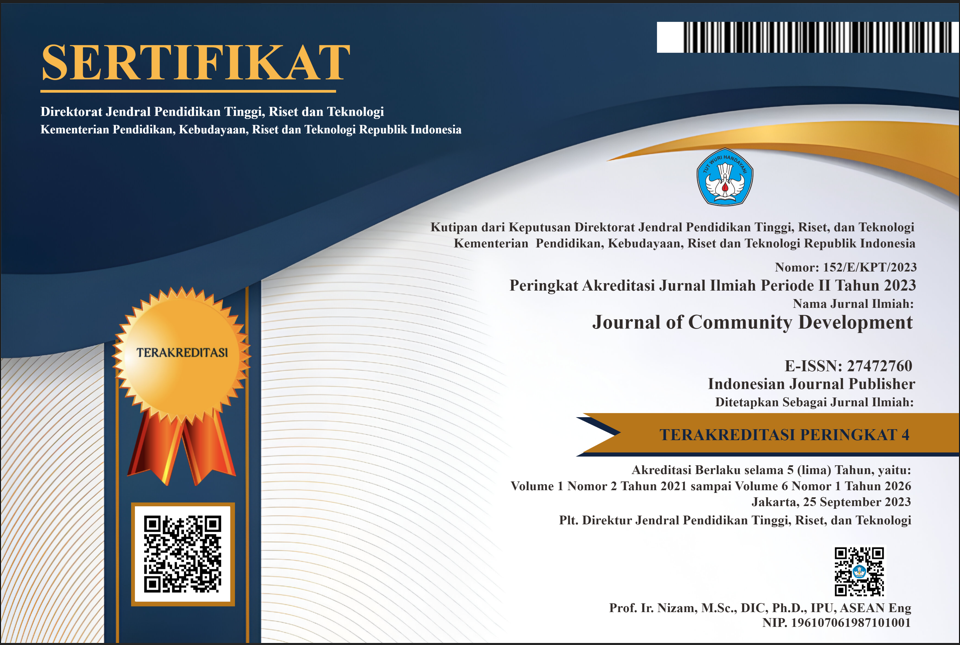Pemberdayaan Masyarakat Dalam Keikutsertaan Pasangan Usia Subur Menjadi Aseptor KB di Kelurahan Ladang Bambu Kecamatan Medan Tuntungan
DOI:
https://doi.org/10.47134/comdev.v3i3.218Keywords:
Family Planning, Acceptors, Reproductive HealthAbstract
The use of family planning (KB) methods by couples of childbearing age is an important step in regulating pregnancy and maintaining reproductive health. However, the successful use of family planning relies heavily on the knowledge of PUS about contraceptive methods as well as their participation in using contraceptives consistently. Lack of knowledge and proper participation can lead to unwanted pregnancies and even trigger abortions.To improve the understanding of PUS about family planning, a health education program was implemented in Kelurahan Ladang Bambu, Medan Tuntungan sub-district in 2023. This education provided information on various contraceptive methods and how to use them correctly, so that PUS can make the right decision in family planning.The results of the education activities showed an increase in PUS knowledge about contraceptives. Comparison of test results before and after the intervention showed a significant increase in knowledge by 0.37 (p<0.05). That is, there was a difference in the average pretest and posttest scores after the health education was conducted, indicating the effectiveness of the program in improving the understanding of PUS related to contraceptive methods. In conclusion, this health education program succeeded in increasing the knowledge of PUS about contraceptive methods. With better understanding, PUS can use family planning more effectively and consistently, reducing the risk of unwanted pregnancy and its implications such as abortion. This program contributes positively to family welfare and reproductive health in the community.
Downloads
References
Anggraini, D. D., Hapsari, W., Nardina, J. H. E. A., Sinaga, L. R. V., Azizah, S. S. N., Argaheni, N. B., Samaria, W. D., & Hutomo, C. S. (2021). Pelayanan Kontrasepsi (A. Karim & J. Simarmata, Eds.; 1st ed.). Yayasan Kita Menulis.
Badan Pusat Statistik Indonesia. (2021, February 4). Hasil Survei Penduduk 2020 Peluang Indonesia Maksimalkan Bonus Demografi | Kementerian Koordinator Bidang Pembangunan Manusia dan Kebudayaan. KEMENKO PMK : Home/Kependudukan & KB :Hasil Survei Penduduk 2020 . https://www.kemenkopmk.go.id/hasil-survei-penduduk-2020-peluang-indonesia-maksimalkan-bonus-demografi
BKKBN. (2022). Hasil Pelaksanaan Program KB Nasional.Cukilan Data Program Keluarga Berencana Nasional. No 255.
Hidayat, N. (2013). Kajian Kebijakan Kependudukan di Indonesia 1 (2) (2013): 24-36. Jurnal Ilmu Administrasi Publik, 1(2), 24–36. http://ojs.uma.ac.id/index.php/publikauma
KemenKes RI. (2020). Profil-Kesehatan-Indonesia-2019. Kementrian Kesehatan Indonesia. https://www.kemkes.go.id/app_asset/file_content_download/Profil-Kesehatan-Indonesia-2019.pdf
Syamsul, S., Bakri, B., & Limonu, H. S. (2020). PENGGUNAAN ALAT KB PADA WANITA KAWIN DI PERDESAAN DAN PERKOTAAN (Studi Hasil SDKI 2017 Provinsi Gorontalo). Jurnal Kependudukan Indonesia, 15(1), 71–84. https://doi.org/10.14203/JKI.V15I1.461
Downloads
Published
How to Cite
Issue
Section
License
Copyright (c) 2023 Karsana, Widia Astuti Tanjung

This work is licensed under a Creative Commons Attribution 4.0 International License.







